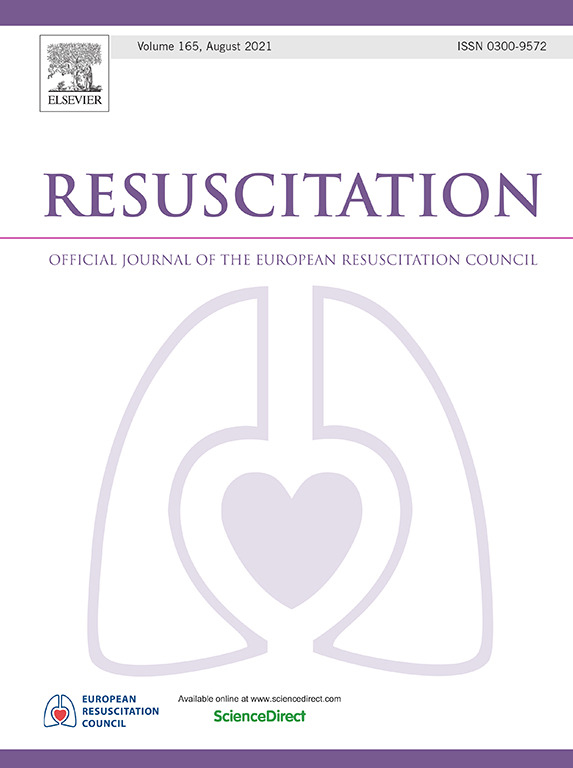Early ADL ability assessment and cognitive screening as markers of post-discharge outcomes after surviving an out-of-hospital cardiac arrest. A prospective cohort study
IF 6.5
1区 医学
Q1 CRITICAL CARE MEDICINE
引用次数: 0
Abstract
Background Assessment of activities of daily living (ADL) and cognitive screening are widely used in the care of out-of-hospital cardiac arrest (OHCA) survivors. Evidence linking them to post-discharge outcomes is limited, but could support targeted rehabilitation efforts. Aim To assess whether ADL ability measures and cognitive screening at hospital discharge were associated with post-discharge ADL ability, health-related quality of life (HRQoL) and return to work. Methods This prospective cohort study included 200 OHCA survivors admitted to Aarhus University Hospital. Self-reported ADL ability was measured using the Activities of Daily Living Interview (ADL-I). Observed ADL ability was measured with the Assessment of Motor and Process Skills (AMPS), dichotomised into age-matched or below-ability. Cognitive function was assessed with Montreal Cognitive Assessment (MoCA). Multivariable regressions, with multiple imputation, analysed associations between variables and outcomes, adjusting for age, sex, and comorbidities. Results Adjusted analyses showed significant associations between personal ADL-I (βadjusted = 0.3, 95%CI: 0.2;0.5) and AMPS (βadjusted = −0.6, 95%CI:-1.2;-0.03) at discharge and self-reported ADL ability six months after cardiac arrest. Baseline AMPS was statistically significantly associated with age-matched ADL ability six months after cardiac arrest (ORadjusted 5.5, 95%CI: 1.5;10.0), and personal ADL-I (VAS: βadjusted = 3.00, 95%CI: 1.3;4.6/index score: βadjusted = 0.03, 95%CI 0.01;0.05) and MoCA (index: βadjusted = −0.09, 95%CI: −0.2;-0.02) with HRQoL. The association between MoCA and return to work one-year after cardiac arrest showed an OR of 3.0 (95%CI: 0.5;9.0), although not statistically significant (p = 0.06). Conclusions Decreased ADL ability at hospital discharge was associated with poorer post-discharge outcomes in OHCA survivors, while cognitive screening was also associated with certain aspects of recovery.
早期ADL能力评估和认知筛查作为院外心脏骤停存活后出院结果的标志。一项前瞻性队列研究。
日常生活活动评估(ADL)和认知筛查被广泛应用于院外心脏骤停(OHCA)幸存者的护理。将它们与出院后的结果联系起来的证据有限,但可以支持有针对性的康复工作。目的评估出院时ADL能力测量和认知筛查是否与出院后ADL能力、健康相关生活质量(HRQoL)和重返工作岗位相关。方法本前瞻性队列研究纳入200名奥胡斯大学医院的OHCA幸存者。自我报告的ADL能力采用日常生活活动访谈(ADL- i)进行测量。观察到的ADL能力是用运动和过程技能评估(AMPS)来测量的,分为年龄匹配或低于能力。采用蒙特利尔认知评估法(MoCA)评估认知功能。多变量回归分析了变量和结果之间的关联,调整了年龄、性别和合并症。结果校正分析显示,出院时个人ADL- i (β校正=0.3,95%CI: 0.2;0.5)和AMPS (β校正=-0.6,95%CI:-1.2;-0.03)与心脏骤停后6个月自我报告的ADL能力之间存在显著相关性。基线AMPS与心脏骤停后6个月年龄匹配的ADL能力(or调整值5.5,95%CI: 1.5;10.0)、个人ADL- i (VAS: β调整值= 3.00,95%CI: 1.3;4.6)和MoCA(指数:β调整值=0.03,95%CI: 0.01;0.05)与HRQoL相关(指数:β调整值=-0.09,95%CI: -0.2;-0.02)。MoCA与心脏骤停一年后重返工作岗位之间的相关性显示OR为3.0 (95%CI: 0.5;9.0),尽管没有统计学意义(p=0.06)。结论:出院时ADL能力下降与OHCA幸存者出院后预后较差有关,而认知筛查也与康复的某些方面有关。
本文章由计算机程序翻译,如有差异,请以英文原文为准。
求助全文
约1分钟内获得全文
求助全文
来源期刊

Resuscitation
医学-急救医学
CiteScore
12.00
自引率
18.50%
发文量
556
审稿时长
21 days
期刊介绍:
Resuscitation is a monthly international and interdisciplinary medical journal. The papers published deal with the aetiology, pathophysiology and prevention of cardiac arrest, resuscitation training, clinical resuscitation, and experimental resuscitation research, although papers relating to animal studies will be published only if they are of exceptional interest and related directly to clinical cardiopulmonary resuscitation. Papers relating to trauma are published occasionally but the majority of these concern traumatic cardiac arrest.
 求助内容:
求助内容: 应助结果提醒方式:
应助结果提醒方式:


